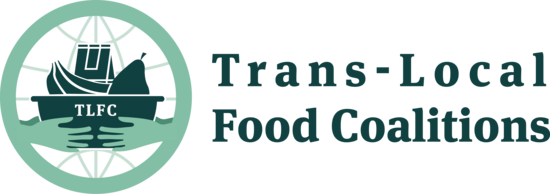
Today’s globalized commodity chains are challenged by the uneven distribution of benefits, the concentration of economic and political power and, more recently, their weakened ability to respond to external shocks, such as economic crises or the Covid-19 pandemic. To address these challenges, individuals, communities, and companies are developing alternative models of commodity chains that directly connect producers and consumers. They promise to be more environmentally sustainable, promote social welfare, create transparency and increase democratic control. But do they actually contribute to an alternative, democratic vision of sustainability or rather follow new forms of ‘green growth’?
This question is at the center of our research project. We focus on Trans-Local Food Coalitions (TLFCs), which are organizations of different forms (initiatives, organizations or companies) that seek to (re)build relationships between food actors at different geographical levels, thereby promoting alternative concepts and practices of globalization.
Objective 1: To develop a conceptual framework that captures the forms and functioning of governance arrangements underlying TLFCs in terms of democracy and sustainability. Research question 1: How can governance arrangements of TLFCs be conceptualised in relation to democracy and sustainability? Objective 2: To investigate existing forms of TLFCs, including their underlying governance arrangements. Research question 2: What types of TLFCs exist and how are their governance arrangements structured? | Topic 1: Governance & organization |
Objective 3: To examine selected TLFCs' governance arrangements in terms of sustainability and democracy. Research question 3: How are democracy and sustainability practiced in TLFCs? Objective 4: To identify and explain commonalities and differences between TLFCs regarding sustainability and democracy. Research question 4: How and why do TLFCs differ with respect to democracy and sustainability? | Topic 2: Sustainable & democratic values |
Objective 5: To generate relevant and usable knowledge for TLFCs to support their efforts in strengthening democratic and sustainable food chains. Research question 5: How can TLFCs be supported in strengthening their efforts to transform globalized food chains towards democracy and sustainability? | Topic 3: Transforming global food chains |
The project combines 1) mapping, 2) a survey, and 3) qualitative case studies in a comparative perspective. The empirical analysis focuses on TLFCs that operate within the global food system but maintain key connections to the German-Swiss-Austrian (GSA) region—in distribution or consumption.
- Mapping is based on an explorative identification of TLFCs in the GSA region. Data is obtained from public online sources.
- Next, an online survey is conducted among the identified TLFCs.
- Case studies are used to understand different types of TLFCs in their specific contexts. In-depth analyses of nine selected TLFCs are conducted following a qualitative multi-method approach that includes non-participant observation, semi-structured qualitative interviews, and document analysis.
The research approach is transdisciplinary, integrating academic perspectives with those of practitioners from TLFCs. Outcomes of this research will include a conceptual framework for the governance of food democracy and sustainability in trans-local value chains. It will also provide a typology of TLFCs in the GSA-region and practical individual as well as comparative case study reports with recommendations for optimized governance of alternative global food value chains.
